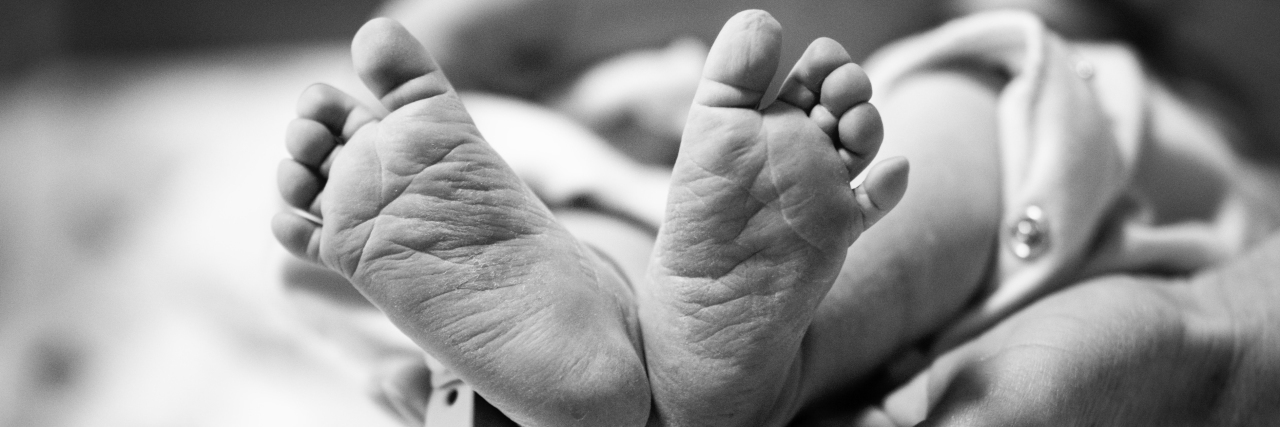I was around 23 weeks pregnant and something just didn’t feel quite right. Being that this was my first pregnancy, I had nothing to compare it to. I did my best to describe the odd sensations and feelings I was experiencing to my midwife during my regular appointment. I was reassured all was well with me and the baby. I ignored my own discomfort, after all, “doctor knows best.”
Exactly one week later, these odd feelings were even more bothersome; I was uncomfortable and sometimes in pain. I called my doctor’s office and once again described the unpleasant feelings I was experiencing. They sent me to the hospital for a checkup. Once I arrived, I was hooked up to monitors and given an exam. I was in labor, dilated 2-centimeters and only 24 weeks pregnant. My doctor was notified and I was immediately admitted to the hospital.
Everything happened quickly. The room filled with nurses — some undressing me and putting me in a hospital gown, others taking record of my status. I was hooked up to more machines and and an IV. I was rushed down the hall in a hospital bed to a room where I was greeted by my doctor. He began to explain to me the statistics of a baby being born too early, and the devastating facts. He said he was going to do his best to try to stop my active labor with heavy medication that would make me feel sick. He was right. Once that medication went through my IV, I felt miserable. To make matters worse, it wasn’t stopping my contractions.
At the time, I was living in a small city. They weren’t equipped to handle my case or a premature baby born at 24 weeks. My doctor decided to transfer me 40 minutes away to the nearest city that was equipped at handling premature births. I was rushed by ambulance. I was terrified. I could tell the nurse that rode with me was terrified by the thought of her having to deliver my small baby in the back of the ambulance.
When I arrived at the hospital, I was greeted by a large team of medical staff that quickly all began to go to work on me. At some point and much medication later, my labor finally stopped, and I found myself alone in a hospital room, heavily medicated, 40 minutes from home. The room was still and I cried. Everything hit me.
I laid in that hospital bed on bedrest for two weeks. I was not allowed to get up, not even to use the bathroom. I was kept heavily medicated to keep my contractions at bay. I was in a teaching hospital so I had lots of medical attention. Sometimes it seemed like too much.
When I was 27 weeks pregnant, my contractions began again and wouldn’t stop despite the medication they continued to pump into me. An ultrasound showed my baby was in breach position and I was now dilated to 3-centimeters with contractions getting worse. I was scheduled for a emergency C-section. I was quickly placed on a operating table surrounded by doctors and students. A short time later, my baby was born: 2-pounds, 2-ounces, 18-inches long. He was quickly taken away while I laid on the operating table, unable to move. I felt helpless and vulnerable. Not only were my insides exposed to a room of strangers, but so were the raw emotions I was feeling.
About two weeks after my son was born, he was transferred to another hospital. His condition was not great and seemed to get worse as the days went by. He needed surgery to release the pressure off his brain caused by a brain bleed. Something that happens often to babies born prematurely. His was a grade-4 head bleed. The worst it could possibly be.
After much medical interventions and undergoing brain surgery, my son passed away in my arms about a month after his birth.
After nearly seven weeks of my life being spent in a hospital fighting for him — watching him fight — it was over. I had to leave the hospital with no need to return. I had to go home without my baby. I had to plan a funeral and pick out a headstone. I felt utterly numb. But yet, I felt more pain than I ever thought possible.
My life was never the same, rightfully so. The agonizing what-ifs still fill my mind 17 years later. What if I was taken more seriously when I first expressed concerns about my pregnancy? What if I listened to my body and my own instincts? What if I had done something different? Would anything have turned out differently?
What I want you all to understand is that America is failing its pregnant women, and that for the third year in a row, preterm birth rates continue to rise, per the CDC. I want you to be aware of the research that proves that 41 percent of parents with a child in the NICU showed symptoms of post-traumatic stress disorder, according to research published in ADC Fetal & Neonatal Edition.
Prematurity Awareness Month is a month dedicated to advocating for the roughly 15 million babies born worldwide every year, who, like my son, are born before 37 weeks gestation. This November, we need to talk about premature births, about the grief and hardships that forever changes families, about the mothers that experience holding their babies in a NICU instead of the comfort of their home.
Finally, I will tell you how important it is that other NICU moms tell their story so no mother feels alone.
Getty image by Pixelistanbul

